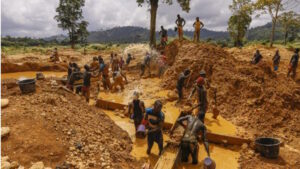By Peter Martey Agbeko, APR
The issue of illegal mining, locally known as galamsey, continues to cast a long shadow over Ghana’s landscape, both physically and metaphorically. Despite countless pledges, national campaigns, and promises of reform, the destructive specter of galamsey persists, eroding the environment, economy, and public trust in equal measure. Recent developments following the Organised Labour’s protest fiasco have left many wondering: Is it back to business as usual?

The Persistent Plague of Galamsey
Ghana’s mineral wealth has been both a blessing and a curse. While gold mining has contributed significantly to the national economy, illegal mining has inflicted catastrophic damage on water bodies, farmlands, and forests.
Rivers such as the Pra, Ankobra, and Offin, once vital lifelines for communities, now run brown with pollution. Farmlands that once sustained generations lie fallow, poisoned by chemicals like mercury and cyanide.
The Organised Labour Protest: A Fumbled Opportunity?
In September, Ghana witnessed a pivotal moment when Organised Labour mobilised for action, ostensibly to challenge government inaction on issues affecting the nation’s workers and resources. Galamsey was expected to take center stage during these protests, given its dire impact on livelihoods and the nation’s ecological future. However, what many hoped would be a clarion call for reform fizzled into what some have called a “spectacle of rhetoric.”
Rather than a united front demanding concrete anti-galamsey action, the protests dissolved into disjointed demonstrations, with little to show for the energy expended. For Ghanaians desperate for change, the outcome was disappointing and left a gaping question: Has the government truly been held accountable for its failure to curb galamsey?
Policies and Promises: A Dismal Track Record
Successive governments have made lofty promises to tackle galamsey. Task forces have been set up, committees formed, and military interventions launched. Yet, these measures have achieved little beyond media fanfare. Allegations of collusion between local officials, political elites, and illegal miners continue to undermine enforcement efforts.
The Minerals Commission, the Environmental Protection Agency (EPA), and other stakeholders often appear hamstrung, underfunded, or unwilling to act decisively. Meanwhile, galamsey operators become more sophisticated, using heavy machinery and evading poorly coordinated raids.
The Human Cost
The human cost of galamsey cannot be overstated. Communities dependent on agriculture face food insecurity as farmlands are destroyed. Fisherfolk lose their livelihoods as polluted rivers drive fish populations to extinction. Health crises stemming from contaminated water, particularly in rural areas, are mounting.
Children, too, are drawn into the fray, with many leaving school to work in dangerous mining pits, perpetuating cycles of poverty and illiteracy.
What Needs to Change?
To break the cycle of inaction and impunity, Ghana must embrace radical reform. Key steps include:
- Strengthened Law Enforcement: Galamsey thrives on weak enforcement. Independent anti-galamsey units with prosecutorial powers, free from political interference, are critical.
- Technology-Driven Monitoring: Real-time monitoring using drones, satellite imagery, and GPS technology can track illegal mining activities more effectively.
- Community Engagement: Local communities must be empowered as guardians of their environment. Incentives for reporting illegal activities and alternative livelihoods can redirect energy away from galamsey.
- Transparent Accountability: Naming and prosecuting officials and political actors involved in galamsey is essential. Without this, every promise will ring hollow.
- Sustainable Mining Policies: Legal mining practices must be incentivized, ensuring miners can operate within a framework that prioritises environmental preservation and community welfare.
Conclusion: A Moment of Reckoning
The Organised Labour protests may have been a missed opportunity, but Ghana cannot afford to continue on its current path. Galamsey is not just an environmental issue; it is a threat to the nation’s sovereignty, economy, and future.
The time for half-measures and empty promises has long passed. Ghana stands at a crossroads. Will we choose decisive action and accountability, or resign ourselves to the grim reality of business as usual? The choice, as always, rests with the leaders—and the people who hold them accountable.










